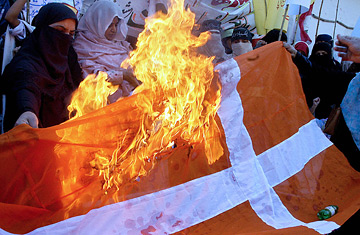
Female Pakistani Muslim protesters hold a burning Danish flag during a demonstration in Lahore, 24 February 2006.
Denmark was awash with cartoons this week, as 17 newspapers republished controversial caricatures of the Prophet Mohammed to protest an alleged plot to murder a cartoonist. Wednesday's media defiance came a day after Denmark's security police (PET) arrested three men on suspicion of planning to murder one of the 12 cartoonists who drew caricatures of the Prophet for the newspaper Jyllands-Posten in 2005. It was these caricatures, commissioned by Jyllands-Posten to fuel a debate on freedom of expression, that caused Muslims worldwide to burn Danish flags and embassies and boycott Danish produce. It became one of the most heated chapters in what many were calling the cultural and ideologal clash between the secular West and the Islamic world.
The republication by Danish media of the caricatures was a gesture of solidarity with the artist, who had been warned against the plot by the police and moved to a safe hiding place already in November last year. "Yesterday's arrest of three people who, according to PET, were planning to kill one of the cartoonists, Kurt Westergaard, is deeply shocking and disturbing. It shows that there are presumably Islamic fanatics who are willing to make a reality of the threats and who respect neither freedom of speech nor the law," wrote national daily Politiken in its editorial. Politiken was among the 17 newspapers that ran a cartoon this week.
With the arrests and the renewed printing of the caricatures, particularly the most controversial one, Westergaard's depiction of the Prophet Mohammed with a bomb in his turban, the question also rose whether new anti-Danish protests would sweep the Middle East and Pakistan. Bjorn Moller, an expert on terrorism and the Middle East, believes this week's cartoons will not have the same effect. "I don't believe there is any major interest in escalating this event in the Arab countries. Last time it turned out to be a strategy that didn't work."
Moller points out that in September 2007, neighboring Sweden was faced with a potentially similar crisis when a small newspaper ran a critical cartoon of the Prophet. The Swedish Prime Minister immediately called in the ambassadors from Muslim countries and told them that he personally didn't sanction the drawing but he couldn't stop freedom of speech. The ambassadors explained the situation to their home government and the issue died down. Says Moller, "I think they are rather trying to deflate this incidence." But Denmark's authorities and embassies worldwide remain on high alert.
While there was some relief at this week's Danish police action, the Intelligence Agency's swift arrest of the three men in the country's second-largest city, Aarhus, has raised legal questions. Two of the men, Tunisians ages 36 and 25, were to be administratively extradited, an extra-judicial shortcut that would avoid taking them through a trial. Meanwhile, the third man, a 40-year-old naturalized Dane of Moroccan origin, was released for lack of evidence, also without a trial. The security service explained that it had achieved its goal: to prevent a murder. It said that if the men had been put on trial PET would be forced to reveal its sources of information and working methods. According to Danish anti-terror law, devised after the 9/11 attacks on the U.S., foreign nationals can be extradited administratively if they are suspected of planning acts of terror.
The plans to extradite the two Tunisians, however, met with strong criticism in Danish media and among legal and political experts. "It is very unfortunate that there will be no trial in a Danish court. This means that all evidence against them is kept secret by PET. That is against the most fundamental principles of a community governed by law," Moller told TIME. He argued that extradition in itself is a punishment and must be imposed by a court of law.
The decision to try and have the two suspects extradited without a trial was also criticized by the Organisation of Islamic Faith in Denmark. In a statement, the community said it feared protests by Muslims in Denmark if the two men were sent back to Tunisia. "We have been able to exert a certain form of control [during the last crisis]. We are afraid we will lose this control if this form of oppressive acts does not stop," the release said.
